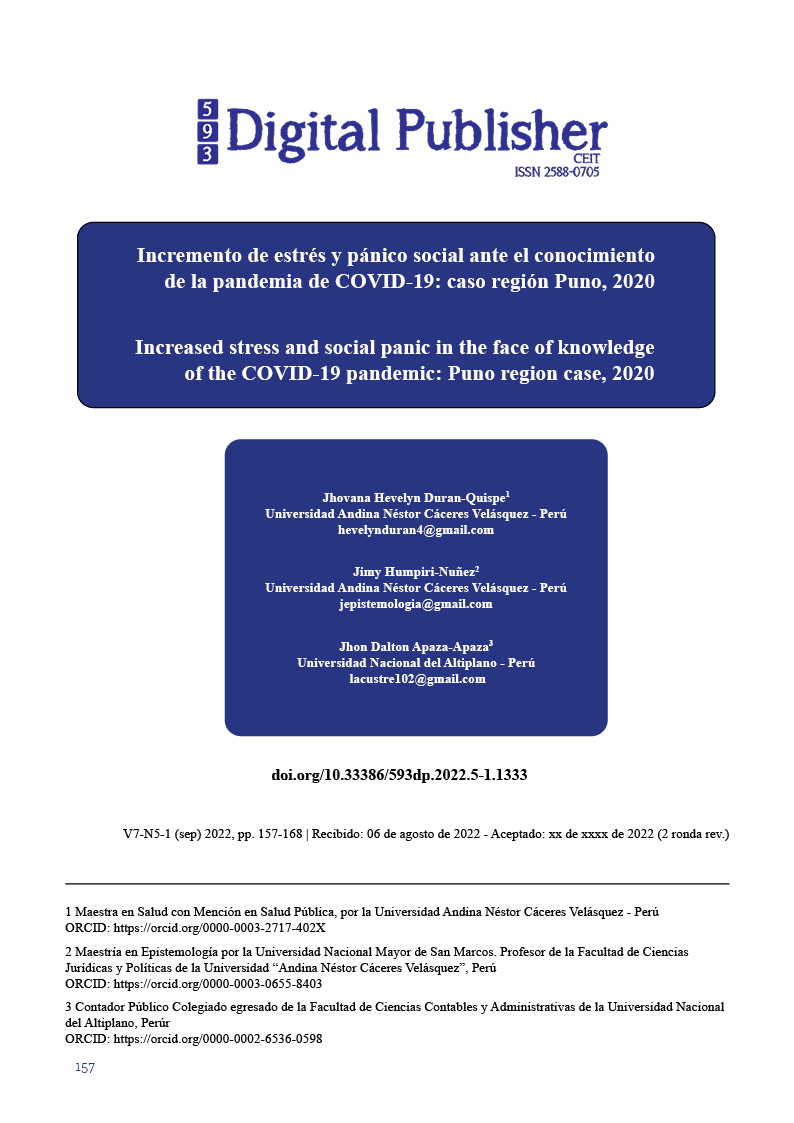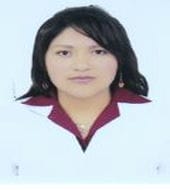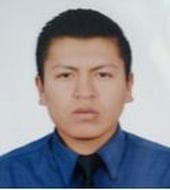Increased stress and social panic in the face of knowledge of the COVID-19 pandemic: Puno region case, 2020
Main Article Content
Abstract
The development of this research aimed to determine the impact of knowledge of the COVID-19 pandemic on the increase in stress and social panic in the case of the Puno region - 2020, under the hypothesis that indicates that the COVID-19 pandemic 19 has had a detrimental impact on the levels of stress and social panic, increasing them significantly in the case of the Puno region, the realization of it was based on the hypothetical deductive method, a quantitative approach, correlational descriptive scope and non-experimental design. , for this, a simple random probabilistic sampling of 317 people from the Puno region was used. For the processing and tabulation of the collected data, statistical tools were used through the program known as SPSS v.24. Finally, the development of the research concluded that the pandemic has been a detrimental factor for the mental health of the Puno population, since in this pandemic reality that we are going through, mental incidents in citizens are a matter of concern for the system. of health and for the professionals who are related to it, since the effects on mental health mentioned will trigger a multitude of cases of diseases due to stress and panic.
Downloads
Article Details

This work is licensed under a Creative Commons Attribution-NonCommercial-ShareAlike 4.0 International License.
1. Derechos de autor
Las obras que se publican en 593 Digital Publisher CEIT están sujetas a los siguientes términos:
1.1. 593 Digital Publisher CEIT, conserva los derechos patrimoniales (copyright) de las obras publicadas, favorece y permite la reutilización de las mismas bajo la licencia Licencia Creative Commons 4.0 de Reconocimiento-NoComercial-CompartirIgual 4.0, por lo cual se pueden copiar, usar, difundir, transmitir y exponer públicamente, siempre que:
1.1.a. Se cite la autoría y fuente original de su publicación (revista, editorial, URL).
1.1.b. No se usen para fines comerciales u onerosos.
1.1.c. Se mencione la existencia y especificaciones de esta licencia de uso.
References
American Psychological Association. (2010). Los distintos tipos de estrés. Tipos de Estrés. https://www.apa.org/topics/stress/tipos
Banco Mundial. (2021). Población, total - Peru. Data Bank Poblaciones Munciales. https://datos.bancomundial.org/indicador/sp.pop.totl?locations=PE
Cantoni Rabolini, M. (2009). Técnicas de muestreo y determinación del tamaño de la muestra en investigación cuantitativa. Revista Argentina de Humanidades y Ciencias Sociales, 7. https://www.sai.com.ar/metodologia/rahycs/rahycs_v7_n2_06.htm
Carrasco Díaz, S. (2005). Metodología de la Investigación Científica. Editorial San Marcos.
Díaz Castrillón, J., & Toro Montoya, I. (2020). SARS-CoV-2/COVID-19: el virus, la enfermedad y la pandemia. BV Salud, 24. https://docs.bvsalud.org/biblioref/2020/05/1096519/covid-19.pdf
Hernández Rodriguez, J. (2020). Impacto de la COVID-19 sobre la salud mental de las personas. Scielo - Scientific Electronic Library Online, 24. http://scielo.sld.cu/scielo.php?script=sci_arttext&pid=S1029-30432020000300578
Hernández Sampieri, R., Férnadez Collado, C., & Baptista, M. del P. (2014). Metodogología de la Investigación (Sexta). McGraw - Hill.
Hernández Sampieri, R., & Mendoza Torres, P. (2018). Metodología de la Investigación: Las rutas cuantitativa, cualitativa y mixta. Mc Graw Hill Education.
Iglesias Villar, N. (2014). Otros factores de riesgo: Estrés. Unidad de Intervencion Educativa - Ministerio Del Interior de España. https://www.dgt.es/PEVI/documentos/catalogo_recursos/didacticos/did_adultas/estres.pdf
López Roldán, P., & Fachelli, S. (2015). Metodología de la Investigación Social Cuantitativa.
Deposito digital de documentos - Universidad Autónoma de Barcelona. https://ddd.uab.cat/record/129382?ln=ca
Ministerio de Salud. (2021). Poblacion por edades - MINSA. Grupos Etarios. http://www.minsa.gob.pe/estadisticas/estadisticas/Poblacion/PoblacionMarcos.asp?21
Monterrosa, Á., Dávila, R., Mejía, A., Contreras, J., Mercado, M., & Flores, C. (2020). Estrés laboral, ansiedad y miedo al COVID 19 en médicos generales colombianos. Revista MedUNAB - Facultad de Ciencias de La Salud, 23. https://doi.org/https://doi.org/10.29375/01237047.3890
Ozamiz, N., Dosil, M., Picaza, M., & Idoiaga, N. (2020). Niveles de estrés, ansiedad y depresión en la primera fase del brote del COVID-19 en una muestra recogida en el norte de España. Scielo.Org. https://doi.org/https://doi.org/10.1590/0102-311X00054020
Ramírez, J., Castro, D., Lerma, C., Yela, F., & Escobar, F. (2020). Consecuencias de la pandemia COVID 19 en la salud mental asociadas al aislamiento social. Scielo - Scientific Electronic Library Online. https://doi.org/https://doi.org/10.5554/22562087.e930
Regueiro, A. (n.d.). ¿Que es el estrés y cómo nos afecta? Universidad de Malaga. https://www.uma.es/media/files/tallerestrés.pdf




